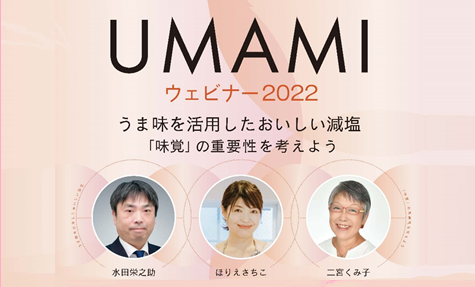The key is to reduce salt stealthily!? ~ Umami Webinar for dietitians 2022
February 2022

The Umami Information Center (UIC) held a webinar titled " How to Use Umami to Reduce Salt Intake in a Delicious Way," on February 15, 2022, with the support of the Japan Dietetic Association. It was the UIC's second webinar for members of the Japan Dietetic Association, following the first in 2021.
This year's speakers were Dr. Einosuke Mizuta (cardiovascular specialist of Sanin Rosai Hospital ), Ms. Sachiko Horie (culinary expert and dietitian), and Dr. Kumiko Ninomiya (UIC consultant).
They spoke about "taste", "salt reduction", and "health" from their viewpoints of a clinical physician, a culinary specialist, and a scientist.
One of the keys to have a long healthy life is to reduce salt intake. However, even if we know that reducing salt is good for us, it is difficult to continue to do.
Dr. Mizuta gave a lecture titled "The Deep Relationship between Umami, Salt Reduction, and Taste”. According to Dr. Mizuta, patients with hypertension, kidney disease, and other conditions tend to have difficulty perceiving saltiness, resulting in a preference for strong flavors.
He presented examples of good result of "taste reset" educational hospitalizations, which improved patients' sensitivity to taste and helped them become accustomed to a low-sodium diet.
In order to keep a low-sodium diet, it is also important to make social efforts to reduce salt intake from processed foods, which is difficult for consumers to control.
Dr. Mizuta introduced the successful example of the British government's efforts to reduce salt in bread. And he talked about the dried fish he developed in cooperation with a local company, which is tasty and low salt at the same time by using umami.

According to Dr. Mizuta, one of the key points of this dried fish product was that he did not use the word "salt-reduced" for sales because people tend to think it does not taste good when they hear the word "salt-reduced”. The dried fish is also used in local school lunches.
“Taste sensitivity must be kept normal.” Dr. Mizuta said. “The key to success is to reduce the amount of salt in your diet gradually and stealthily without being aware of it.” Many of the webinar participants were impressed at the idea of “stealthily reducing salt” and the importance of salt reduction versus nutritional intake for the elderly.

Ms. Sachiko Horie, a popular cooking expert on magazines and WEB/SNS, gave a lecture titled "Simple Cooking Techniques to Remember - Using Dashi and Umami”.
She talked about the characteristics of umami and how to use it effectively in home cooking, with useful tidbids of cooking techniques that you can use today.
She showed her recipes with full of ideas that take advantage of umami, referring to her own experiences in overcoming her eldest son's picky eating on vegetables by using umami. She introduced lots of cooking techniques making good use of umami rich foods, such as vegetable both made from "off-cut veggies" and her unique ways to use frozen tomatoes, etc. Seeing the ideas that can be used today, participants commented, "GOT IT!”, “I would definitely like to try this recipe at home.”
In the panel discussion that followed, Dr. Kumiko Ninomiya, a UIC consultant, opened the session by introducing a case study on "umami and salt reduction". She scientifically explained the relationship among soups, such as chicken soup and miso soup, salt content, and umami. She said that even if the salt content is low, adding just the right amount of umami can increase satisfaction, and that saltiness and umami accentuate each other.

Dr. Ninomiya presented a table comparing the frequency of soup intake in US, France and Japan, and introduced the latest study on the relationship between soup intake and obesity. "Epidemiological studies have shown that the higher the frequency of soup intake, the lower the tendency to obesity is observed." she said. According to the study, people who consume soup more frequently tend to have a lower obesity coefficient BMI, abdominal circumference, and hip circumference to abdominal circumference ratio. Dr. Ninomiya stated that it is important to reduce salt in soups and it is possible to cover the deliciousness by using umami.
In the panel discussion that followed, moderator Chisa Murakami led discussion on the key points for long-lasting salt reduction *1 and tips to make younger people more aware of salt reduction *2, etc.
The webinar was well accessed by more than 200 participants who enjoyed the rich content of this year's webinar.
The webinar can be viewed on YouTube below.
https://www.youtube.com/watch?v=Wt-HfrGeMo
*1
People tend to have a negative image to the word "salt reduction”. Therefore, the secret to long-lasting success is not to make people aware of the importance of salt reduction. It is also important to make the food tasty. – Dr. Mizuta
*2
The total amount of salt you eat in your lifetime determines whether you would get sick or not. Please tell young people to be aware of this from a young age. If you cook umami rich low-sodium dishes for your family, whole family can develop the habit of "delicious low-sodium" diet. – Dr. Mizuta
The younger generation may not be really interested in salt reduction. Therefore, it may be helpful to let them think about salt reduction from the "beauty" point of view, telling that salty dish may cause them to eat too much rice or become swollen easily. – Ms. Horie
Even if you tell students that it is good to prepare meals with an awareness of umami, if they do not know how umami tastes like, there is no way to become aware of it. I think it would be a good idea for school to have a class which have students taste and understand umami. – Dr. Ninomiya
